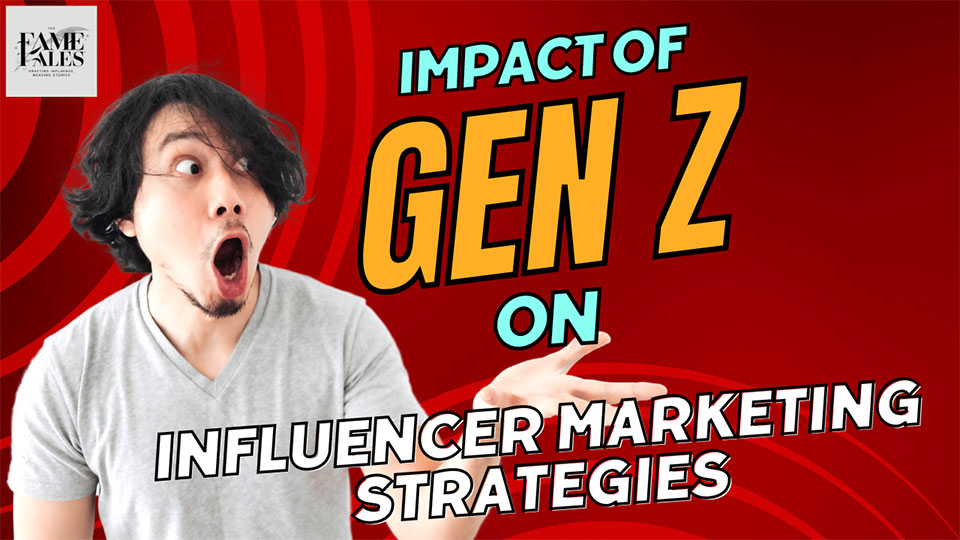The Impact of Gen Z on Influencer Marketing Strategies

Introduction
The advent of Generation Z, born between the mid-1990s and early 2010s, has dramatically reshaped the landscape of influencer marketing. Known for their digital savviness, social consciousness, and distinct consumer behaviors, Gen Z demands new strategies for brands aiming to connect with this influential demographic. This blog delves into the profound impact of Gen Z on influencer marketing strategies, offering insights and tips for brands to navigate this dynamic terrain effectively.
Understanding Gen Z: A Digital-First Generation
Gen Z is the first generation to grow up with the internet and social media as integral parts of their lives. This digital-first approach means they consume information, interact with brands, and make purchasing decisions differently from previous generations. Here are key characteristics of Gen Z that influence their engagement with influencer marketing:
- Authenticity: Gen Z values authenticity and transparency in influencer content. They can easily spot and dismiss inauthentic endorsements.
- Social Responsibility: They are highly socially conscious, supporting brands and influencers who advocate for social causes.
- Short Attention Span: With a short attention span, Gen Z prefers bite-sized, visually engaging content.
- Tech-Savvy: Proficient in navigating multiple digital platforms, they expect seamless and innovative online experiences.
The Shift in Influencer Marketing Strategies
1. Emphasis on Micro-Influencers
While macro-influencers and celebrities have dominated influencer marketing for years, Gen Z's preference for genuine connections has propelled the rise of micro-influencers. These influencers, with smaller but highly engaged followings, often come across as more relatable and trustworthy. Brands targeting Gen Z should:
- Collaborate with Micro-Influencers: Partner with influencers who have authentic engagement with their audience. This can lead to higher credibility and stronger brand loyalty.
- Leverage Niche Markets: Utilize micro-influencers to tap into specific niches and communities, ensuring the brand message resonates deeply with the target audience.
2. Prioritizing Authentic Content
Gen Z's demand for authenticity has pushed brands to focus on genuine, unscripted content. To meet this expectation:
- Encourage Real Stories: Work with influencers to share personal stories and experiences with the brand, rather than scripted promotions.
- User-Generated Content: Foster a community of brand advocates who create and share their own content, showcasing real use cases and testimonials.
3. Integrating Social Causes
Social responsibility is a significant aspect of Gen Z's consumer behavior. Brands that align with meaningful causes can build stronger connections with this demographic. Strategies include:
- Partnering with Cause-Driven Influencers: Collaborate with influencers who are passionate about social issues relevant to the brand's values.
- Highlighting Sustainability: Promote sustainable practices and products, and work with influencers who advocate for environmental consciousness.
4. Utilizing Emerging Platforms
Gen Z is quick to adopt new social media platforms, often migrating away from traditional ones. To stay relevant:
- Explore New Channels: Engage with audiences on emerging platforms like TikTok and Twitch, where Gen Z spends considerable time.
- Create Platform-Specific Content: Tailor content to fit the unique formats and cultures of different platforms, enhancing engagement and reach.
5. Interactive and Engaging Content
Given their short attention spans, Gen Z prefers interactive and visually stimulating content. Brands can leverage:
- Live Streams and Q&A Sessions: Offer real-time interaction opportunities, making the brand experience more engaging and immediate.
- Interactive Stories and Polls: Use features like Instagram Stories to create polls, quizzes, and interactive content that encourages participation.
6. Data-Driven Insights
Data analytics play a crucial role in understanding and targeting Gen Z effectively. Brands should:
- Analyze Engagement Metrics: Track and analyze data on content performance, audience engagement, and conversion rates to refine strategies.
- Personalize Content: Use data insights to create personalized content that resonates with individual preferences and behaviors.
Benefits of Adapting to Gen Z Influencer Marketing Strategies
Enhanced Engagement and Loyalty
By aligning with Gen Z's values and preferences, brands can foster deeper engagement and build long-term loyalty. Authentic interactions and meaningful content create a sense of community and trust.
Greater Reach on Emerging Platforms
Adapting to new and popular platforms ensures that brands remain visible and relevant to Gen Z. This approach not only expands reach but also positions the brand as innovative and forward-thinking.
Positive Brand Image
Aligning with social causes and promoting sustainability can enhance a brand's image, making it more attractive to socially conscious consumers. This positive perception can lead to increased brand advocacy and customer retention.
Increased Conversion Rates
Micro-influencers and authentic content often lead to higher conversion rates. Gen Z's trust in these influencers can translate into more effective marketing campaigns and improved ROI.
Better Market Insights
Leveraging data analytics provides valuable insights into Gen Z's behavior, preferences, and trends. These insights enable brands to make informed decisions, optimize marketing strategies, and stay ahead of the competition.
Conclusion
Gen Z's influence on influencer marketing is undeniable. Their demand for authenticity, social responsibility, and innovative content is reshaping how brands approach marketing strategies. By understanding and adapting to these preferences, brands can not only engage effectively with Gen Z but also build lasting relationships and achieve sustainable growth.
In the ever-evolving world of digital marketing, staying attuned to the needs and behaviors of emerging generations is crucial. As Gen Z continues to shape the future of influencer marketing, brands that embrace these changes will be well-positioned to succeed in this dynamic landscape.
Other Blog
- Influencer Marketing for Small Businesses: Tips and Tricks
- The Impact of Gen Z on Influencer Marketing Strategies
- How to Find the Right Influencers for Your Brand in 2024
- The Rise of Micro-Influencers in 2024: Why Smaller is Bigger
- How to Measure ROI in Influencer Marketing: Tools and Techniques
- The Benefits of Long-Term Influencer Partnerships
- How to Use Influencer Marketing for Product Launches
- The Ethics of Influencer Marketing: What Brands Need to Know
- How to Avoid Common Pitfalls in Influencer Marketing Campaigns
- The Future of Influencer Marketing: Predictions for the Next 5 Years
Related Blogs

Influencer Marketing for Small Businesses: Tips and Tricks

The Impact of Gen Z on Influencer Marketing Strategies

How to Find the Right Influencers for Your Brand in 2024

The Rise of Micro-Influencers in 2024: Why Smaller is Bigger

How to Measure ROI in Influencer Marketing: Tools and Techniques

The Benefits of Long-Term Influencer Partnerships

How to Use Influencer Marketing for Product Launches

The Ethics of Influencer Marketing: What Brands Need to Know

How to Avoid Common Pitfalls in Influencer Marketing Campaigns

